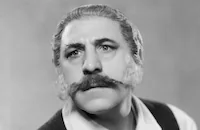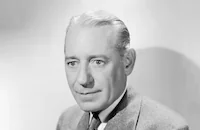Dinky

Brief Synopsis
Cast & Crew
D. Ross Lederman
Jackie Cooper
Mary Astor
Roger Pryor
Henry Armetta
Betty Jean Hainey
Film Details
Technical Specs

Synopsis
Before secretary Martha Daniels leaves to visit her son Dinky at his military academy, her boss, Gerald Standish, asks her to sign some checks. At the Academy, Martha listens proudly as her popular son tells her he will soon be made a sergeant. While they talk, she is called to the colonel's office, where two men arrest her because the bond certificates that she signed for Standish were fraudulent. Standish is now missing and even though Martha protests that as the secretary, she knew nothing about the bonds, she is tried and found guilty. Not wanting Dinky to know that she is going to prison, she arranges with her sympathetic lawyer, Tom Marsden, to forward her letters from a false Chicago address. Despite their efforts, Dinky sees a newspaper article about Martha and runs away from school. Marsden finds him and reassures him about his mother's innocence, but Dinky refuses to return to the Academy to face the cruelty of the other cadets. Instead, Dinky attends school at the neighboring orphanage and writes to his mother on Academy stationery so that she will think he is still there. At the orphanage, he helps the other children earn money to buy new football uniforms for the coming match with the academy. Dinky is the team's best player, but his mother's absence upsets him so much that he continually makes mistakes. Suddenly, he sees his mother, whose innocence was proven after Standish was found in Mexico. Inspired by her presence in the stands, Dinky makes a touchdown and the winning kick. After having won the game for the orphans, Dinky returns to the Academy, where he earns his sergeant's stripes after all.

Cast

Jackie Cooper

Mary Astor

Roger Pryor

Henry Armetta
Betty Jean Hainey

Henry O'neill
Jimmy Butler
George Ernest
Edith Fellows
Sidney Miller

Richard Quine
Frank Gernardi

Clay Clement

Addison Richards
Florence Fair

James Burke

Joseph Crehan
Crew

Film Details
Technical Specs

Articles
Dinky
Cooper began his career at age three in comedy shorts, and became a regular in the "Our Gang" series a few years later. At nine he played the title role in Skippy (1931), directed by his uncle Norman Taurog, and was nominated for an Academy Award® as Best Actor for his performance. (Cooper still holds the record as the youngest-ever nominee in that category.) The film made him a star, and led to other acclaimed performances in films such as The Champ (1931) and Treasure Island (1934).
In Dinky Cooper plays the title character, a student at a military boarding school, and Astor plays his hard-working single mother, who supports him by toiling as a secretary. She is framed in a fraudulent bond scam, and goes to jail. The film concerns her efforts to keep her boy from learning of her disgrace, and his efforts to keep her from learning that he's left school. In her memoir, Astor refers to her films of that era as "the dreary eighteen--the real ee-uch ones, the bilge, the junk, the unforgivably bad....There was Dinky, however. It was also pretty ee-uch but I remember it because of Jackie Cooper....He was a nice kid, very unlike the repulsive child life that infested the sets....He was intelligent and hardworking and never boring about tedious antics on the set."
She also remembers him as a bit of a method actor. A scene in which Dinky gets into a fight during football practice was shot on location at a military school, with actual students at the school. Cooper insisted that the fisticuffs be real, and was frustrated and angry that the other boys weren't really punching him. Astor writes that he ran to his mother crying, "I hate being a movie actor -- I hate it! I want to be a guy, a man; I don't want fellows like this to treat me like a sissy!" Astor adds, "Did I ever identify with that rebellious kid!"
Cooper, who was 12 when he made Dinky, was fast approaching that awkward adolescent age, and the New York Times noted that he "soon will be in long pants," calling that eventuality "dreadful...disheartening." Variety's review of Dinky was lukewarm: "Lacks the pull and importance of previous efforts with this kid star." But childhood stardom was only the first act of Cooper's career. He reinvented himself several times over, as a theater and television actor, director, producer and character actor.
For Astor, Dinky was among the first of her many mother roles, but she still had a lot of career highs ahead of her, including several great roles and a Best Supporting Actress Oscar®. Both she and Cooper did better work in better films, but there's a sweetness in their scenes together in Dinky, and a real and lasting affection. Astor recalled that in the late 1950s and early 1960s, when both were working in television and ran into each other, he always greeted her fondly as "Mom."
Director: D. Ross Lederman, Howard Bretherton
Screenplay: Harry Sauber, story by John Fante, Frank Fenton, Samuel Gibson Brown
Cinematography: Arthur Edeson
Editor: Thomas Richards
Art Direction: John Hughes
Principal Cast: Jackie Cooper (Dinky Daniels), Mary Astor (Martha Daniels), Roger Pryor (Tom Marsden), Henry Armetta (Junkman), Betty Jean Hainey (Mary), Henry O'Neill (Mr. Barnes), Edith Fellows (Sally), Richard Quine (Jackie Shaw)
65 minutes
by Margarita Landazuri

Dinky
Quotes
Trivia
Notes
According to news items in Daily Variety Ricardo Cortez was set to replace Ian Hunter who was working in A Midsummer Night's Dream, but when Hunter became available, Cortez was replaced. Roger Pryor later replaced Hunter in the role of "Tom Marsden." Some scenes were filmed on location in San Diego. Actress Betty Jean Hainey's name is spelled "Betty Jane Haney" in the onscreen credits.
















